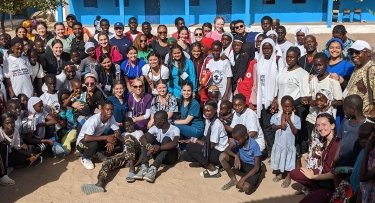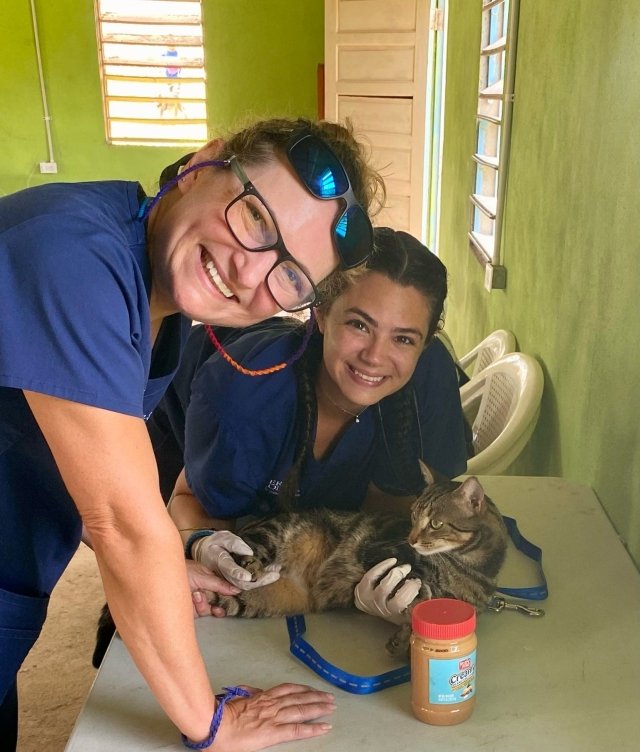
Mercy students and faculty with residents of a village in The Gambia, where they provided free medical care to approximately 750 patients.
Mercy University is known for hands-on learning and for serving the community. The School of Health and Natural Sciences (SHNS) takes this to the next level with medical missions and international service trips that provide students with valuable, experiential professional experience while giving back to people in under-resourced communities around the world. In 2023, many of these trips — including those to the Dominican Republic, The Gambia, Belize and Guatemala — resumed for the first time since 2019.
In March, students and faculty from SHNS traveled to the Dominican Republic on a five-day trip organized and sponsored by Friends of Lead- Free Children and Continental Food and Beverage Inc./Inca Kola USA. The team — which included a total of 16 students from the Physician Assistant Studies, Physical Therapy, Communication Disorders and Occupational Therapy Assistant Studies programs — provided free medical care to hundreds of people.
“It’s such a win-win situation because the patients get the help they need and the students get to practice being providers,” said Nicole Jarck, M.S. ’23, who recently graduated from the Physician Assistant Studies program. “I just wish we could do more.” Several students, including Jarck, mentioned that service trips were part of why they chose to attend Mercy in the first place.
Over the course of three days, the Mercy team treated patients in three different locations: a school in Santo Domingo Este, a school northwest of Santo Domingo and a rural clinic near the sugar cane fields in the San Pedro de Macoris region. At each clinic site, people lined up for hours to see the Mercy team.
“I was so proud to see that students were able to apply what they’ve learned with such compassion and empathy,” said Nannette Hyland, P.T., Ph.D., professor and program director of physical therapy. “It’s very different to do an evaluation on the spot when you don’t have a full hour to work with the patient in a fully equipped facility.”
“It took just seconds for students to start working with each other to figure out how to treat each patient,” said Brian Baker, M.D., assistant professor in the Physician Assistant Studies program. “That collaboration is exactly what they’ll have to do once they start practicing because medicine is truly a team sport.”
Two months later, students from the Physician Assistant Studies program traveled to The Gambia. Over the course of five days, the Mercy team — which included 22 students, two alumni and four faculty members — provided free medical care to approximately 750 patients in both a makeshift clinic in Penyem village and the Bundung Maternal and Child Health Hospital. The trip was organized by the African Cultural Exchange.
“Many people hadn’t seen a doctor since the last time Mercy visited four years ago,” said Emily See, M.S. ’24. “There were patients with lots of problems, some of whom we couldn’t help because it was years too late. That was heartbreaking.”
The Mercy team treated a variety of medical needs ranging from basic to emergencies. For example, patients had lacerations, infected abscesses and fungal infections. One person was vomiting blood, a few had seizures while waiting in line and a baby arrived in full respiratory distress. Students also got to see diseases that are rare in the U.S., including syphilis and tuberculosis.
“Students put together pieces from the whole didactic year to formulate diagnoses,” said Lorraine Cashin, M.S. ’01, assistant professor and director of the Physician Assistant Studies program. “There’s such value in them practicing how to use their own observations and patients’ responses to come up with diagnoses as opposed to relying on all the tests and machines that practitioners often use in the U.S.”
See was grateful for all the practice: “Faculty members really let us lead everything with zero judgment, which was amazing. I learned how to think on my feet. I was thinking about not just how to treat a patient but maybe five treatments down the line because we didn’t have access to the first four.”
Mercy students also treat nonhuman patients. In July, students in Mercy’s Veterinary Technology program traveled to Belize as part of the Small Animal Veterinary Experience course, which is organized and run by the Belize Wildlife and Referral Clinic. The team — three Mercy students and two faculty members along with seven students from the University of Tennessee — helped provide care to over 100 animals, primarily dogs and cats.
The team focused on supporting Seven Miles, a rural village that until recently did not have electricity or running water. Many villagers do not have transportation, so it is challenging for them to get professional care for their pets. Students performed physical exams, provided medications for deworming and fleas, screened pets for infectious diseases and even played an active role as anesthetists and surgical nurses in procedures such as spays and neuters.

“The Mercy students were very impressive and rose to the occasion,” said Sandra Bertholf ’97, M.S. ’18, assistant professor and associate director of the Veterinary Technology program. “It was exciting for me as a teacher to see how well they applied their knowledge and skills to this unusual clinical situation where they didn't have all the technology they're used to back in the U.S.”
Every January, students can attend a 10-day trip to locations such as Belize, Guatemala or Peru as part of the Mercy course “Global Veterinary Experience” in which they gain experience in treating wildlife such as monkeys, snakes, iguanas, manatees, crocodiles, large cats, turtles, coatimundis and tamanduas.
Taylor Battaglia ’23 went on both the July and January trips and described how meaningful they were: “On these trips, I grew my technique and grew as a person. The professors trusted us to take the lead and help the other students. It proved to me that I do know what I’m doing and that this work is everything I want my life to be.”
Though many students returned home from these international trips wishing they could do more to help, several pledged to return on future trips and seek out other ways to volunteer. SHNS’ service-minded students will undoubtedly continue to give back and draw on the lessons they learned on these trips for the rest of their careers.
This article is from the Maverick Magazine Fall 2023 issue. To read more, click here.
